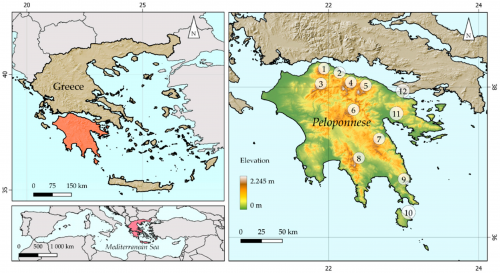A systematic review on the Greek endemics of Peloponnese, which aims to asses the ecosystem services potential of endemic floras has been conducted by a team of leading experts, amongst whom are the MAIA project partners Dr. Ioannis Kokkoris and Prof. Panagiotis Dimopoulos of the University of Patras, Greece. The newly published MAIA-supported paper is available in the Sustainability open access journal.
As the interest in new, natural, sustainable products arises in many fields, wild plants are reconsidered as providers of traditional or innovative applications. The notion of ecosystem services (ES) provides a frame to evaluate their benefits, but is still scarcely applied to endemic floras. The conducted study reviews the available literature on the ES provided by the 494 taxa endemic to Greece that are present in Peloponnese. Six main categories are isolated: medical, aromatic, folk medicine, antimicrobial, environmental and craftsmanship interests.
Spatial hotspots with a high density in taxa providing ES are mapped, while gaps of knowledge on the ES of endemic taxa are highlighted. Taxonomic and phylogenetic bounds between taxa are exploited as a base to explore potential properties for endemic taxa. The basis for the development of predictive tools utilising literature review datasets is set.
Final outcomes also provide robust scientific evidence to support decision and policy making for the sustainable use and management of rural areas. The development of cultivation areas for threatened taxa of interest is suggested as a potent conservation measure, by selecting fields according to habitat suitability models.
Read the full paper here.


